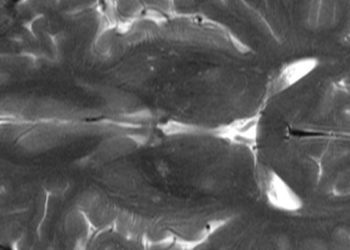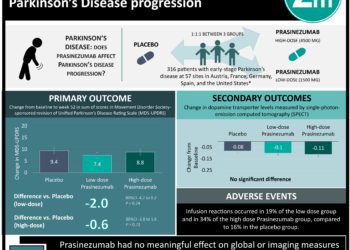Neurostimulation beneficial in Parkinson’s disease with early motor complications
Feb 14th – Neurostimulation improved quality of life for Parkinson’s disease patients with early levodopa-induced motor complications.
[tabs tab1=”2MM Rundown” tab2= “2MM Full Report”]
[tab]
Image: CC/Hellerhoff
1. Neurostimulation improved quality of life for Parkinson’s disease patients with early levodopa-induced motor complications.
The study showed that neurostimulation could improve quality of life when given in combination with medical therapy for Parkinson’s disease with early levodopa-induced motor complications. While physicians have typically reserved neurostimulation for levodopa-responsive disease with late stage motor complications, a pilot trial study has shown that it could be beneficial for early and mild Parkinson’s disease as well.
This study followed patients up to 24 months and did not offer insights as to how these patients fared over the long term, having received neurostimulation so early in the disease course. Future follow-up studies may help determine any long-term impacts of neurostimulation.
Click to read the study in NEJM
[/tab]
[tab]
Image: CC/Hellerhoff
1. Neurostimulation improved quality of life for Parkinson’s disease patients with early levodopa-induced motor complications.
This [randomized] study evaluated the clinical benefits of adding neurostimulation to standard medical therapy for Parkinson’s disease with early levodopa-induced motor symptoms.
251 patients were randomly assigned one of two treatment regimens – the neurostimulation group underwent bilateral stereotactic implantation of electrodes and a pulse generator in the subthalamic nucleus in addition to dopaminergic therapy. The medical therapy group received dopaminergic therapy alone.
Validated scales were used to assess quality of life, cognition and mood. By 24 months, the quality of life score had improved by 26% in the neurostimulation group and worsened by 1% in the medical therapy group (P=0.002).
Cognitive assessments did not show significant between-group differences. Emotional outcomes were in favor of neurostimulation in mood changes and overall psychiatric morbidity. The study concludes that addition of neurostimulation to standard medical therapy may be therapeutic for levodopa-induced complications of Parkinson’s disease at an earlier stage.
In sum: The study showed that neurostimulation could improve quality of life when given in combination with medical therapy for Parkinson’s disease with early levodopa-induced motor complications. While physicians have typically reserved neurostimulation for levodopa-responsive disease with late stage motor complications, a pilot trial study has shown that it could be beneficial for early and mild Parkinson’s disease as well.
This study followed patients up to 24 months and did not offer insights as to how these patients fared over the long term, having received neurostimulation so early in the disease course. Future follow-up studies may help determine any long-term impacts of neurostimulation.
Click to read the study in NEJM
By Xiaozhou Liu and Mitalee Patil
More from this author: Rivaroxaban has no net clinical benefit over enoxaparin for thromboprophylaxis in acutely ill patients, Long term functional outcomes similar with surgery, radiotherapy in prostate cancer patients
© 2013 2minutemedicine.com. All rights reserved. No works may be reproduced without written consent from 2minutemedicine.com. Disclaimer: We present factual information directly from peer reviewed medical journals. No post should be construed as medical advice and is not intended as such by the authors or by 2minutemedicine.com. PLEASE SEE A HEALTHCARE PROVIDER IN YOUR AREA IF YOU SEEK MEDICAL ADVICE OF ANY SORT. Content is produced in accordance with fair use copyrights solely and strictly for the purpose of teaching, news and criticism. No benefit, monetary or otherwise, is realized by any participants or the owner of this domain.
[/tab]
[/tabs]




